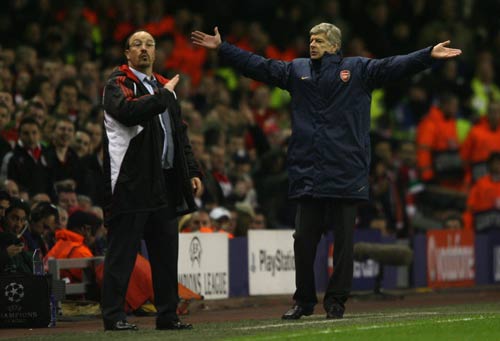Wenger's men sunk by failure to splash out
A season that promised rich returns has lost interest as Arsenal have run out of reserves. Sam Wallace examines the harsh truths that have devalued their manager's admirable economic policies

Arsène Wenger has a habit of spending Arsenal's transfer funds as if the money comes out of his own pocket. It is an admirable approach in an age where one man has sunk more than £500m into building a Premier League dynasty at Chelsea. It is a quality some think is lost to the English game – faith in young talent built on brilliant judgement. It is risky and brave. On Tuesday at Anfield it also seemed doomed to fail.
For years, Wenger has set the benchmark in the transfer market with an ability to sign players cheap and sell high, to make profits while others spend fortunes and to build better teams at the fraction of a cost. Sunderland were once known as the "Bank of England club", for their perceived wealth – now Arsenal deserve the title for their frugality. But against Liverpool in the Champions League quarter-final second leg on Tuesday, they would surely have swapped all their £73.9m cash surplus for a defender who would not jump in on Ryan Babel and a striker who could nick an equaliser.
There is a reason that Arsenal's season has begun to resemble the proverbial teenage house party, meaning that it was great fun at first but, left to their own devices, the kids ended up making a mess of the whole show. At a crucial stage experience and depth of quality have been absent: there has been too much pressure on the likes of Cesc Fabregas, Emmanuel Adebayor and Alexander Hleb, who are expected to keep the team moving when they are running on empty.
William Gallas is not a man to spare people's feelings regarding the reasons for defeat. "We lacked experience," the Arsenal captain said. "You can't concede a penalty 30 seconds after equalising." Gallas also said that the team had "overachieved" this season, which tells you everything about how he rated Arsenal's chances in the first place.
Of course, when Fabregas, Hleb and the boys were handing down a passing lesson in a 1-1 draw at Anfield in October it looked like there were no limits to the new generation. But only Wenger watches them every day in training, so only he knew who was tired and who could keep playing until June. The Arsenal manager scrutinises his players every day, says he knows when they are tired, or preoccupied, or off form. So why did he not see his team's crash coming?
Go back to September last year, when the Arsenal chairman, Peter Hill-Wood, announcing a turnover in excess of £200m, recalled a conversation between Wenger and the major shareholder, Danny Fiszman. Fiszman asked Wenger what he would do if given £100m to spend. Wenger said he would give it back. At Arsenal there was general delight and a touch of smugness at the manager's frugal brilliance in the transfer market. That September, Arsenal said they had £73.9m in the bank. More than £20m profit was made in the summer transfer window.
If Arsenal had spent the £26.5m Liverpool invested in Fernando Torres they would probably have still broken even. They also might be in the Champions League semi-finals. When the Spanish striker turned Philippe Senderos on Tuesday night and thumped in his 29th goal of the season, no one in the Kop was heard to opine that £26.5m was still a bit steep.
It is extraordinary how Wenger operates on a shoestring, but maybe someone should remind him that he does not have to. And, yes, on value-for-money it probably does make him a better manager than his peers. But, unfortunately for Arsenal, they do not yet award the European Cup on that basis; there are just the winners and the losers, the latter of which is the category to which Arsenal belong, once again, this season.
In the logic of modern football – far-removed from the world of ordinary folk – there is no shame in breaking the bank for a great player. If any manager deserves to do so, then it is surely Wenger. Of course, to do so will mean he forfeits his right to be sanctimonious about the money Chelsea throw around. But if he signs Samuel Eto'o or Karim Benzema or, perish the thought, Dimitar Berbatov, then it will surely have been worth it. Great footballers cost a lot of money because they have a profound effect on the teams in which they play.
Get 4 months free with ExpressVPN
Servers in 105 Countries
Superior Speeds
Works on all your devices
ADVERTISEMENT. If you sign up to this service we will earn commission. This revenue helps to fund journalism across The Independent.
Get 4 months free with ExpressVPN
Servers in 105 Countries
Superior Speeds
Works on all your devices
ADVERTISEMENT. If you sign up to this service we will earn commission. This revenue helps to fund journalism across The Independent.
Wenger has bought some great players, but he has never bought the most expensive. Perhaps the money has not been available; perhaps he has not fancied the players available; perhaps it conflicts with his philosophy. But this Arsenal team, with all its Wenger discoveries, is surely a great striker, midfielder and centre-half away from being a great side.
The Arsenal manager said that a run of four games in 12 days would define his team's season. Three games in, they have suffered two defeats and a draw and Manchester United are waiting on Sunday. He is absolutely right: this sequence has defined Arsenal. They are not yet good enough to win a major trophy.
Join our commenting forum
Join thought-provoking conversations, follow other Independent readers and see their replies
Comments